|
|
|
Sort Order |
|
|
|
Items / Page
|
|
|
|
|
|
|
| Srl | Item |
| 1 |
ID:
147852
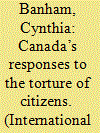

|
|
|
|
|
| Summary/Abstract |
Traditional analyses of Canada’s behaviour on international human rights tend to view it through the prism of the state’s global identity as a good international citizen. Such explanations are limited in helping us understand Canada’s inconsistent responses to allegations that two citizens were tortured in the war on terror—Maher Arar and Omar Khadr. This article uses Jutta Brunnée and Stephen Toope’s interactional account, which emphasizes the need for continuous shared practices of legality in order for international human rights norms to exert influence, to analyze Canada’s responses to the torture of citizens. It argues that to make sense of Canada’s behaviour, we need to examine the role of different state and non-state actors in terms of whether they were agitating for Canada’s compliance with the international prohibition against torture. Civil society was critical in shaping the responses of the Canadian state to the torture of citizens.
|
|
|
|
|
|
|
|
|
|
|
|
|
|
|
|
| 2 |
ID:
147846
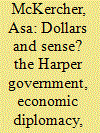

|
|
|
|
|
| Summary/Abstract |
Over its near-decade of governance, Canada’s Conservative government developed an international agenda that narrowly construed international engagement as economic diplomacy. Rooted in the Conservatives’ desire to establish themselves with voters as shrewd stewards of the Canadian economy, economic and commercial calculations took precedence, trumping even military spending and the Arctic, both defining portfolios for Prime Minister Stephen Harper. We demonstrate the economic essence of the Conservative government’s international agenda and examine outcomes related to trade, the extractive resource sector, and the Canada–US relationship. We argue that the dramatic overhaul of Canada’s public diplomacy, strategic and security agendas, and global cooperation initiatives was a result of a limited conception of foreign policy that prioritized economic and commercial objectives. The legacy of economic diplomacy is a renewed focus on the question of international engagement as a means to a Canadian end as a new Liberal government contends with the consequences of economic diplomacy.
|
|
|
|
|
|
|
|
|
|
|
|
|
|
|
|
| 3 |
ID:
147847
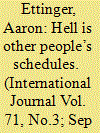

|
|
|
|
|
| Summary/Abstract |
Since 2001, Canada has participated in multilateral security operations in Afghanistan and Libya, and as part of the anti-ISIS coalition. Canada’s contributions have been the sum of eleven distinct time-delimited missions ranging from six months to four years. Until now, this variation in strategic duration has drawn little scholarly attention. This paper investigates the logic underpinning Canada’s variable mission commitments. We find that the actions of specific allies, as well as the NATO alliance as a whole, can account for the particular duration of Canadian military commitments. External pressure, combined with Canada’s internationalist orientation, reputational concerns, and the relative weakness of Canada’s Parliament, contributes to a cycle of engagement and re-engagement whereby extrication is perceived to come with high costs in reputation. This creates a dilemma for Canadian governments: participate in multilateral operations and be seen as a good ally, but cede control over strategic duration to forces beyond your control; or, don’t participate and risk that standing.
|
|
|
|
|
|
|
|
|
|
|
|
|
|
|
|
| 4 |
ID:
147848
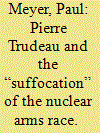

|
|
|
|
|
| Summary/Abstract |
Prime Minister Pierre Trudeau is known for his challenge to Canada’s NATO policy at the beginning of his tenure in power and his peace initiative at its end. Less well known is his support for innovative arms control policies designed to eliminate the technological impetus behind the nuclear arms race between the US and the USSR during the Cold War. At the first UN Special Session on Disarmament in May 1978, Trudeau delivered a speech outlining a “strategy of suffocation” that provided a novel package of four arms control measures that, taken as a whole, would represent an effective means of halting and eventually reversing the nuclear arms race. Although the superpowers were largely indifferent to them, these ideas helped spur the Department of External Affairs to invest in developing the institutional capacity to enable Canada to play a leadership role in future disarmament diplomacy.
|
|
|
|
|
|
|
|
|
|
|
|
|
|
|
|
| 5 |
ID:
147851
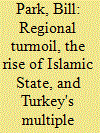

|
|
|
|
|
| Summary/Abstract |
This article traces the interrelationship of the roles played by Turkey and by various Kurdish non-state actors such as the Kurdistan Regional Government, the Kurdistan Workers Party, and the Democratic Union Party, in the current turmoil in Syria and Iraq. It considers their varying perspectives on Islamic State and other jihadi groups, the tensions between the region's Kurdish non-state actors, and the differences between them in their relationships with Turkey. The background to these differences is explored, as is their impact on relationships with other actors, most notably the US. The article concludes by noting that Turkey as a regionally powerful and coherent actor, and the Kurds as a distinct ethnic group with aspirations to self-determination, will continue to be powerful elements in the region's politics.
|
|
|
|
|
|
|
|
|
|
|
|
|
|
|
|
| 6 |
ID:
147849
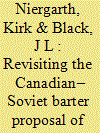

|
|
|
|
|
| Summary/Abstract |
In the autumn of 1932, when Canada had massive agricultural surpluses and hunger was afflicting millions of Soviet citizens, a proposal to trade Canadian cattle for Soviet fuels attracted considerable public support. Negotiated by a syndicate of Canadian businessmen, the cattle–oil barter deal was initially stalled because Conservative prime minister R.B. Bennett was ideologically opposed to it. Soviet documents suggest that this was not the end of the story. Revisiting the cattle–oil barter in light of these documents complicates current accounts of Canadian–Soviet relations in this period and raises questions about the Bennett government’s attitude to international trade and sensitivity to the kind of public pressure exerted by the proposal’s many Canadian supporters. In spite of major obstacles, the potential mutual benefit of the project nearly overcame ingrained mutual distrust.
|
|
|
|
|
|
|
|
|
|
|
|
|
|
|
|
| 7 |
ID:
147853


|
|
|
|
|
| Summary/Abstract |
In mid-1971, an advertisement from Air Canada (then a Canadian Crown corporation) and South African Airways appeared in the pages of the Globe and Mail, Canada’s national newspaper. It offered prospective vacationers the chance of a lifetime: the opportunity to tour the game parks of South Africa and Rhodesia, including the famous Kruger National Park, with stays afterward in various African cities.
News of Air Canada’s “opportunity” was met with a great deal of controversy. Linda Freeman has described anti-apartheid forces in the 1970s as “vocal, but not particularly strong” and other scholars argue that Canadian policy toward South Africa did not change substantially between 1961 and 1984. Still, this case study demonstrates that despite the fact that no major Canadian economic, strategic, or political interest was involved in South Africa and that while Canadian trade with South Africa during the period in question was relatively marginal, the Canadian government gave the concerns of those appalled at Air Canada’s intransigence some attention. More importantly, so did Air Canada. Where government failed to act, public pressure forced a major Canadian corporation to rethink its business practices to adhere to international human rights norms.
|
|
|
|
|
|
|
|
|
|
|
|
|
|
|
|
| 8 |
ID:
147850


|
|
|
|
|
| Summary/Abstract |
In the spring of 2011 the Syrian civil war emerged as a late chapter of the “Arab Spring,” a chapter that in retrospect has turned out to be the most complex and potentially most serious. How such crisis events are framed in press coverage has been identified as important with respect to possible responses the international community makes under the doctrine of Responsibility to Protect (R2P). By most indicators (number of casualties, number of refugees, plus the use of chemical weapons against civilians), Syria certainly qualified as a candidate for the application of a UN Security Council authorized R2P reaction response; yet during the first two-and-a-half years of the war no such action was forthcoming.
|
|
|
|
|
|
|
|
|
|
|
|
|
|
|
|
|
|
|
|
|